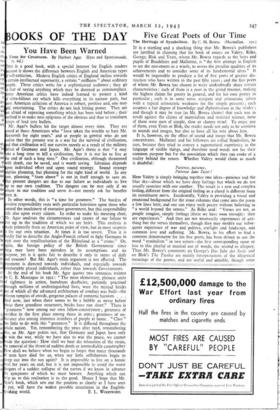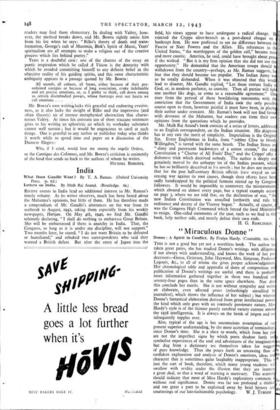Five Great Poets of Our Time
The Heritage of Symbolism. By C. M. Bowra. (Macmillan. ass.) IT is a startling and a shocking thing that Mr. Bowra's publishers are justified in claiming that his book of essays on Valery, Rilke, George, Blok and Yeats, whom Mr. Bowra regards as the heirs and pupils of Bauddaire and Mallarme, is " the first attempt in English to see the movement as a whole, to assess the peculiar qualities of its achievements and to consider some of its fundamental ide.as." It would be impossible to produce a list of five poets of greater dis- tinction who have written in the past fifty years ; and the five poets of whom Mr. Bowra has chosen to write undoubtedly share certain characteristics: each of them is a poet in the grand manner, making the highest claims for poetry in general, and for his own poetry in particular ; each is in some sense arrogant and aristocratic (often with a typical aristocratic weakness for the simple peasant) ; each assumes a fair degree of knowledge and sbphistication in the reader ; and though it may be true (as Mr. Bowra claims) that each was in revolt against the claims of materialism and material science, none of them were men of simple, slow or clumsy mind. To enjoy any of them, even Yeats or Blok, the reader needs not only to be sensitive to sounds and images, but also to have all his wits about him.
It is, however, on the effect of sound and image that Mr. Bowra concentrates. Mallarme and his followers are called Symbolists, he says, because they tried to convey a supernatural experience in the language of visible things, and therefore used words not for their common purpose but fear the association which they can evoke of a reality behind the senses. Whether Valery would claim as much is doubtful: Patience, patience, Patience doss fazur I
Here Valery is simply bringing together two ideas—patience and the blue sky—about which we have deep feelings but which we do not usually associate with one another. The result is a new and complex feeling, different from the original feeling as a chord is different from its constituent notes. Incidentally, Valery is providing a visual and emotional background for the stone columns that come into the poem a few lines later, and one can enjoy such poetry without believing in "a world beyond the senses." As Rilke said: "Verses are not, as people imagine, simply feelings (these we have soon enough): they are experiences." And they are not necessarily experiences of any- thing but the verses themselves, though they may modify our subse- quent experience of war and politics, starlight and landscape, and common love and suffering. Mr. Bowra, in his effort to find a common denominator for his five poets, has been driven to use the word " symbolism " in two senses—the first corresponding more or less to this playful or musical use of words, the second to allegory. Thus Mr. Bowra's comments on George's Das lahr der Seele and on Blok's The Twelve are mainly interpretations of the allegorical meanings of the poems, and are useful and sensible, though some
readers may find them elementary. In dealing with Valery, how- ever, the method breaks down, and Mr. Bowra rightly omits him from his list when he says: " Rilke's theory of death and trans- formation, George's cult of Maximin, Blok's Spirit of Music, Yeats' spiritualism are all attempts to make a religion out of the creative process which lies behind poetry."
Yeats is a doubtful case: one of the charms of the essay on poetic inspiration which he called A Vision is the dexterity with which he avoided committing himself to any definite belief in the objective reality of his guiding spirits, and this same characteristic ambiguity appears in a passage quoted by Mr. Bowra : All sounds, all colours, all forms, either because of their pre- ordained energies or because of long association evoke indefinable and yet precise emotions, or, as I prefer to think, call down among us certain disembodied powers, whose footsteps over our hearts we call emotions . . .
Mr. Bowra's own writing. lacks this graceful and endearing evasive- ness, as it also lacks the insight of Rillce and the impressive (and often illusory) air of intense metaphysical abstraction that charac- terises Valery. At times his constant use of short staccato sentences gives to his writing an aphoristic air which its workaday substance cannot well Sustain; but it would be ungracious to cavil at such things. One is grateful to any author or publisher today who thinks it worth while to spend time and paper on a discussion of the Duinese Elegies: Who, if I cried, would hear me among the angelic Orders, or the Cantique des Cobh:nes, and Mr. Bowra's criticism is eminently of the kind that sends us back to the authors of whom he writes.
MICHAEL ROBERTS.



























 Previous page
Previous page